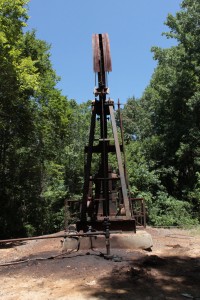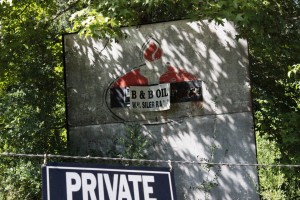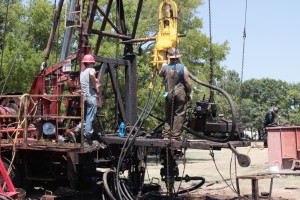Texas Charging More in Penalties to Drilling Violators

Dave Fehling / StateImpact
Well in Rusk County in one of the oldest oil fields in Texas
But Are They Being Penalized Enough?
The state’s regulator for oil & gas drilling, the Railroad Commission of Texas, said it’s charged over $2.1 million in penalties called “severance fees” to drilling violators so far this fiscal year that ends August 31. That’s almost double the amount in 2010.
“The severance fee charges are up, because in May 2012 the commission instituted a 150 percent surcharge on most fees paid to the commission, including severances,” wrote the commission’s spokesperson, Ramona Nye, in an email to StateImpact Texas.
The fees result when the Railroad Commission uses one of its harsher enforcement methods: an order to shutdown production because a well operator has failed to correct violations. The Railroad Commission says the majority of violations are corrected before that happens.
But when operators correct problems only after the severance order has been issued, they then have to pay the fee before they can legally resume production after bringing wells into compliance with state laws.
Wells Unplugged
The most common types of violations pursued by the commission are for failing to put up signs identifying the operator of a well, failure to plug an old well to keep it from leaking, and failing to take precautions to prevent groundwater pollution.
StateImpact Texas analyzed data on violations for a three-year period, from 2009 through 2012, and found that operators with the most alleged violations were, not surprisingly, also the state’s biggest oil & gas producers. But not always.

Dave Fehling / StateImpact
Wells operated by B & B Oil Inc. in Rusk County came under scrutiny by the Texas Railroad Commission
The data showed that one operator, B&B Oil Inc., had 968 alleged violations. But unlike big operators that showed similar numbers of total alleged violations, B & B Oil was producing only hundreds of barrels a month, not thousands of barrels a day according to the commission’s production data.
Some of the citations were for 33 oil wells in Rusk County in East Texas. The Railroad Commission alleged B&B had failed to plug and that were a potential “hazard to public health and safety” because the wells might leak into the groundwater.
Banned in Texas

Dave Fehling / StateImpact
Roughnecks on drilling rig "working over" an old well along a city street in Kilgore. Hear more in our RADIO STORY
At a Railroad Commission hearing held in 2010, B&B said it was having trouble bringing the wells into compliance because of conflicts with business partners over who would foot the bill, according to commission records.
The Railroad Commission eventually banned B&B Oil from operating. According to the commission, cleaning up the unplugged well sites in Rusk County could cost almost $1.3 million dollars.
According to the commission, it confiscated B&B’s “financial security” — a type of bond — in the amount of $250,000. How to get the rest was a matter turned over to the Texas Attorney General’s office. But the Railroad Commission said the case was closed earlier this year after the Attorney General deemed the debt “uncollectable.”
Efforts by StateImpact to reach B&B Oil for comment were unsuccessful. Calls made to a phone number listed for the company by the Railroad Commission would not go through. An address listed was for a UPS Store in Kerrville, where a clerk said the company had a mailbox that was closed some months ago.
Not Tough Enough?
While the Railroad Commission says it uses fees from oil & gas industry to pay for cleaning up so-called ‘orphan wells,’ government watchdog groups have criticized Texas law as too lax, requiring bonds that aren’t nearly big enough to cover the cost of the remediation of old and polluted well sites.
One group, Earthworks, published a report last year criticizing the Railroad Commission for using severance orders too sparingly and for not checking to make sure operators actually stopped producing after ordered to shutdown by the commission.

